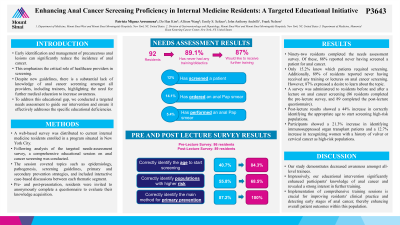Tuesday Poster Session
Category: Colon
P3643 - Enhancing Anal Cancer Screening Proficiency in Internal Medicine Residents: A Targeted Educational Initiative
Tuesday, October 29, 2024
10:30 AM - 4:00 PM ET
Location: Exhibit Hall E


Patricia Miguez Arosemena, MD
Mount Sinai West, Icahn School of Medicine at Mount Sinai
New York, NY
Presenting Author(s)
Patricia Miguez Arosemena, MD1, Do Han Kim, MD2, Allison Wang, MD1, Emily Seltzer, DO, MS1, John A. Andrilli, MD3, Frank Nelson, MD1
1Mount Sinai West, Icahn School of Medicine at Mount Sinai, New York, NY; 2Mount Sinai Morningside and West, Icahn School of Medicine at Mount Sinai, New York, NY; 3Mount Sinai Morningside, Icahn School of Medicine at Mount Sinai, New York, NY
Introduction: Early identification and management of precancerous anal lesions can significantly reduce the incidence of anal cancer, emphasizing the critical role of healthcare providers in screening. Despite new guidelines, there is a substantial lack of knowledge of anal cancer screening amongst all providers, including trainees, highlighting the need for further medical education to increase awareness. To address this educational gap, we conducted a targeted needs assessment to guide our intervention, ensuring it effectively addresses the specific educational deficiencies.
Methods: A web-based survey was distributed to current internal medicine residents enrolled in a program situated in New York City. Following analysis of the targeted needs-assessment survey, a comprehensive educational session on anal cancer screening was conducted. The session covered topics such as epidemiology, pathogenesis, screening guidelines, primary and secondary prevention strategies, and included interactive case-based discussions between each thematic segment. Pre- and post-presentation, residents were invited to anonymously complete a questionnaire to evaluate their knowledge acquisition.
Results: Ninety-two residents completed the needs assessment survey. Of these, 88% reported never having screened a patient for anal cancer. Only 15.2% knew which patients required screening. Additionally, 89% of residents reported never having received any training or lectures on anal cancer screening. However, 87% expressed a desire to learn about the topic.
A survey was administered to residents before and after a lecture on anal cancer screening (86 residents completed the pre-lecture survey, and 89 completed the post-lecture questionnaire). Post-lecture results showed a 44% increase in correctly identifying the appropriate age to start screening high-risk populations. Participants showed a 21.3% increase in identifying immunosuppressed organ transplant patients and a 12.7% increase in recognizing women with a history of vulvar or cervical cancer as high-risk populations.
Discussion: Our study demonstrates decreased awareness amongst all-level trainees. Impressively, our educational intervention significantly enhanced participants' knowledge of anal cancer and revealed a strong interest in further training. Implementation of comprehensive training sessions is crucial for improving residents' clinical practice and detecting early stages of anal cancer, thereby enhancing overall patient outcomes within this population.
Note: The table for this abstract can be viewed in the ePoster Gallery section of the ACG 2024 ePoster Site or in The American Journal of Gastroenterology's abstract supplement issue, both of which will be available starting October 27, 2024.
Disclosures:
Patricia Miguez Arosemena, MD1, Do Han Kim, MD2, Allison Wang, MD1, Emily Seltzer, DO, MS1, John A. Andrilli, MD3, Frank Nelson, MD1. P3643 - Enhancing Anal Cancer Screening Proficiency in Internal Medicine Residents: A Targeted Educational Initiative, ACG 2024 Annual Scientific Meeting Abstracts. Philadelphia, PA: American College of Gastroenterology.
1Mount Sinai West, Icahn School of Medicine at Mount Sinai, New York, NY; 2Mount Sinai Morningside and West, Icahn School of Medicine at Mount Sinai, New York, NY; 3Mount Sinai Morningside, Icahn School of Medicine at Mount Sinai, New York, NY
Introduction: Early identification and management of precancerous anal lesions can significantly reduce the incidence of anal cancer, emphasizing the critical role of healthcare providers in screening. Despite new guidelines, there is a substantial lack of knowledge of anal cancer screening amongst all providers, including trainees, highlighting the need for further medical education to increase awareness. To address this educational gap, we conducted a targeted needs assessment to guide our intervention, ensuring it effectively addresses the specific educational deficiencies.
Methods: A web-based survey was distributed to current internal medicine residents enrolled in a program situated in New York City. Following analysis of the targeted needs-assessment survey, a comprehensive educational session on anal cancer screening was conducted. The session covered topics such as epidemiology, pathogenesis, screening guidelines, primary and secondary prevention strategies, and included interactive case-based discussions between each thematic segment. Pre- and post-presentation, residents were invited to anonymously complete a questionnaire to evaluate their knowledge acquisition.
Results: Ninety-two residents completed the needs assessment survey. Of these, 88% reported never having screened a patient for anal cancer. Only 15.2% knew which patients required screening. Additionally, 89% of residents reported never having received any training or lectures on anal cancer screening. However, 87% expressed a desire to learn about the topic.
A survey was administered to residents before and after a lecture on anal cancer screening (86 residents completed the pre-lecture survey, and 89 completed the post-lecture questionnaire). Post-lecture results showed a 44% increase in correctly identifying the appropriate age to start screening high-risk populations. Participants showed a 21.3% increase in identifying immunosuppressed organ transplant patients and a 12.7% increase in recognizing women with a history of vulvar or cervical cancer as high-risk populations.
Discussion: Our study demonstrates decreased awareness amongst all-level trainees. Impressively, our educational intervention significantly enhanced participants' knowledge of anal cancer and revealed a strong interest in further training. Implementation of comprehensive training sessions is crucial for improving residents' clinical practice and detecting early stages of anal cancer, thereby enhancing overall patient outcomes within this population.
Note: The table for this abstract can be viewed in the ePoster Gallery section of the ACG 2024 ePoster Site or in The American Journal of Gastroenterology's abstract supplement issue, both of which will be available starting October 27, 2024.
Disclosures:
Patricia Miguez Arosemena indicated no relevant financial relationships.
Do Han Kim indicated no relevant financial relationships.
Allison Wang indicated no relevant financial relationships.
Emily Seltzer indicated no relevant financial relationships.
John Andrilli indicated no relevant financial relationships.
Frank Nelson indicated no relevant financial relationships.
Patricia Miguez Arosemena, MD1, Do Han Kim, MD2, Allison Wang, MD1, Emily Seltzer, DO, MS1, John A. Andrilli, MD3, Frank Nelson, MD1. P3643 - Enhancing Anal Cancer Screening Proficiency in Internal Medicine Residents: A Targeted Educational Initiative, ACG 2024 Annual Scientific Meeting Abstracts. Philadelphia, PA: American College of Gastroenterology.
